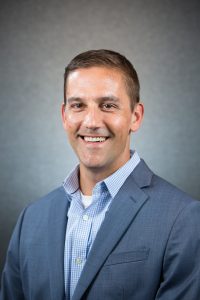Leadership, Landing Gear and a Late-Career Supply Chain Degree

It’s hard to talk about Travis Keys’ leadership skills and aerospace industry success without a pun about careers taking off, but we’ll restrain ourselves. Meet Keys, an advanced-career alum and champion of the UW Foster School of Business Master of Supply Chain Management program. Keys shares some insights on his work with the cutting edge aerospace and defense company, UTC Aerospace Systems, and how the MSCM program has optimized the way he leads and participates in teams.
Right out of college, Keys started working at Trader Joe’s. He worked his way up to manager, was supervising staff and ordering products to keep the store stocked and running. The supply chain gears started turning. “I wasn’t buying for the company, I was just ordering to maintain one particular location,” Keys said. “But that really started to give me a feeling for how things function in a supply chain, even at the end tail of it.”
Fourteen years later, Keys accepted a role at UTC Aerospace Systems, one of the world’s largest suppliers of aerospace and defense products. The global company employs nearly 40,000 people, and supports aerospace giants like Boeing and Airbus. Keys grew animated while speaking about the aerospace industry. “Aerospace and airplanes are super exciting to me,” Keys said. “I’ve always enjoyed keeping an eye out for different kinds of planes at the airport, I feel that kind of connection to the work. When the opportunity to work with UTC came up, it was great to be able to combine something that exciting with my career.”

The business unit that Keys works for is in charge of landing gear. “Now when I’m traveling, I’m always peering down from the gate to try and see what they’ve got,” Keys laughs. Keys is in charge of operational support; he manages things like shipping and receiving, material management and taking care of manufacturing processes. His team is at the very end of the supply chain, handling the final steps before products get sent down the road to different Boeing factories. “I work at a small site nested in a really elaborate environment. So we all work very closely together on challenges; could be parts coming in late or not having the right people to put things in the right places at the right time. We have to work together to find those solutions. That’s what I really enjoy, solving the puzzle and overcoming those hurdles as a team.”
Keys thrived in the teamwork-centered environment while he was a student in the Master of Supply Chain Management program. He was particularly impressed with the diverse community of students. “It was pretty incredible how our cohort ranged from people three weeks out of their undergraduate degree to people with 18+ years of work experience. And the work itself was diverse, the methods and ways people did things. It was a great chance to meet people from around the world and from different backgrounds and to have all those experiences brought together. It really reinforced for me the value of diversity, and that there isn’t one right way to do something.”
Keys was far from a supply chain novice when he enrolled in MSCM, and still gained valuable insights from the program that applied directly to his work with UTC Aerospace Systems. The leadership methodologies baked into the program were particularly impactful. “There were a bunch of things in the leadership class that I could actually take and use immediately. In particular was the idea of tailoring your management style to each individual. Everyone has a different way that they’d like to be led. I immediately started to adjust my style by asking my people essentially, ‘Ok, what do you need from me?’ rather than trying to guess or interpret their reactions. It was eye opening and incredibly applicable to my work.”
The MSCM program gave Keys an opportunity to improve in the present as well as to think critically about the future of the supply chain industry. Students were encouraged to think five to ten years ahead, to predict future challenges and innovations. “At the level of the biggest companies in the world, I think there will be continued consolidation through mergers and acquisitions, leading to greater capitalization on economies of scale and buying power. Use of efficiency tools and techniques will continue to find their way into non-traditional applications away from manufacturing and distribution, generating savings opportunities for more industries, such as health care, health/beauty services and restaurants.”
The changes in Keys’ leadership style and strategic thinking didn’t go unnoticed by his employer while he was a MSCM student. “Showing the tenacity and dedication to work full time while taking on the rigors of a full-time master’s program raised my visibility with senior leadership in the company,” Keys said. The MSCM program is demanding, but Keys emphasized how the rigor went hand-in-hand with an enjoyable and supportive community. “Understand that it will go by very quickly and have fun with your classmates. You are all taking on this challenge together. One year is not that long a period, and you can handle the work.”
In his spare time, Keys is a fan of running marathons and enjoys good beer, “But not always at the same time,” he laughed. Now that the program is over and he has his weekends back, he spends them traveling with his lovely wife. We like to imagine that on those trips, he daydreams about leadership and the beautiful complexity of the supply chain ecosystem as he stares out the airplane window. Between daydreams, he squints excitedly at the landing gear, checking to see if they have the latest model.
To learn more about how the MSCM program can take your career to the next level, click here.
Written by Victoria Pinheiro, MSc.
MSCM Content Strategy Writer
[email protected]
